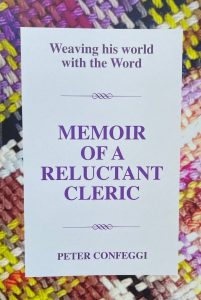Pope Francis has given a new vision for governance and ministry. We have the new wine of synodality and it is now time for new wineskins. It is time to DO synodality, writes Peter Confeggi.
Being retired from active ministry and living outside the ‘clerical bubble’ has given me time for reading and reflection. One of the most significant books that I have read in recent years is Charles Taylor’s A Secular Age. He writes, “Why is it virtually impossible not to believe in God in, say 1500 in our western society, while in 2000, many of us find this not only easy, but inescapable?”
Finding the shape of faith and walking together in faith communities in a secular world takes on new challenges.
Pope Francis has given a new vision for governance and ministry. We have the new wine of synodality and it is now time for new wineskins. It is time to DO synodality. Francis has appointed some women to key positions in the Vatican. While the debate on the ordination of women has vast ramifications for relationships with the orthodox world, ordination or sex is not a prerequisite for being appointed cardinal. One can only imagine how gender balance in the College of Cardinals might enliven the tired and old Church that Cardinal Martini spoke of in his final interview in 2012.
At the local level some simple commitments would give flesh to this vision: no all-clergy committees, all committees to have gender balance beyond tokenism, personnel boards to include representatives of pastoral councils and pastoral planning teams. Furthermore, formation in governance, leadership and change management to be undertaken with clergy and a diverse group of other diocesan leaders.
The parable of the Sower and the Seed (Mk 4; Matt 13:4-9) is seen as a foundation for understanding all the parables. Mark has Jesus saying, ‘if you don’t understand this parable, you won’t understand any of them.’ Matthew begins and ends his teaching on the parable with two imperatives: imagine and listen.
As the Plenary Council of the Australian Catholic Church has concluded, could this next paragraph be framed in the process of synodality?
As the Australian Catholic community following the process of a Plenary Council, the imperatives of this foundational parable are vital: to listen and imagine. The future is not more and the past and the future is not what it used to be.
Much of the pressure to continue in active priestly ministry until you draw your final breath comes from the perceived shortage of clergy. I have long believed that there is no such shortage of priests but rather a shortage of imagination and courage.
While the door to the ordination of women in the Catholic Church remains firmly closed, my experience has been that women are often in the forefront of leadership, pastoral care, community building and often preside well in liturgy.
Catholics in secular Australia fall into three classes: lapsed, moderate and extreme. Many have simply walked away. Reform groups like Concerned Catholics Tasmania support one another in the hope of eventually having leadership capable of conversation.
Extreme restorationist groups bear little of the joy of the Gospel. However, they do make sense in the broader social context of a world that is ripe for restorationist movements: Make America Great Again (MAGA), Brexit, Reclaim Australia, and Putin’s vision of a new Russian Empire. The supposed security of the past is no substitute for the responding creativity to a change in a cultural context.

By Peter Confeggi, Huon Press.
Being retired from active ministry in a very secular context has heightened the truth that I have been ministering in a secular society for decades. That reality was so often clouded by the all-consuming demands of the ‘holy huddle’ and very often feeding the over fed.
Sacristy ministry can be a great temptation when roles are clear and the pious are not going to be confronted with the questions, or the disbelief, of a secular age. By contrast, most of Jesus’ engagement was a ministry of presence and he was more at home at table with people rather than in the Temple of the Synagogue.
Christendom is no more. As Taylor notes, France, New Zealand and Australia are the most secularised nations in the world. Studies and my experience in living outside the ‘clerical bubble’ would suggest that Tasmania is one of the least religious states of Australia.
Lamenting the passing of the Church of my childhood, where many believed the was no salvation outside the Church, is futile. Being fearful of the secular and disappearing into a spirituality of nostalgia, believing that if we go back and do what we used to do everything will be as it is to be, is to abrogate the Gospel challenge to imagine and listen to the Spirit and fail to nurture the seed.
While in 1500 there was a culture that made it almost impossible not to believe in God, five centuries later a secular culture can militate against such belief. Good missionaries begin by studying the culture in which they live. As people of faith we ignore the signs of our times and our secular culture at our own risk.
This is an edited extract from Peter Confeggi’s book, ‘Memoir of a Reluctant Cleric’ (Huon Press, 2022).
